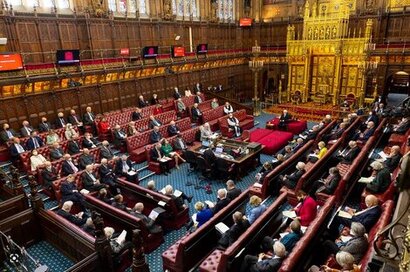Energy and resources are a key focus on technology and action.
House of Lords adds renewable energy clauses to UK Government’s Energy Bill
Two clauses added by the House of Lords to the Government’s Energy Bill mean households and businesses can become customers of community-led local renewable energy companies.
The addition to the Bill may lead a twentyfold growth in renewable energy generation from such schemes within a decade. The addition of the clauses was supported by 320 MPs from all parties, including 127 Conservatives. Hundreds of councils, the National Trust, the Church of England and over 80 other national organisations also support the proposals.
The reform would improve energy market competition, create tens of thousands of skilled jobs and help reduce customers’ energy bills, whilst accelerating the construction of new clean energy infrastructure. Money from energy bills would be kept local and would improve local economies across the country, while increasing local provisions for support of vulnerable customers.

UK Government funding supports systems drawing heat from deep underground to drive down energy bills
The Langarth Deep Geothermal Heat Network will involve drilling to a depth of 5,275 metres to extract the heat from granite rocks beneath the United Downs Industrial Site in Cornwall. It is one of seven state-of-the-art heating systems that will receive a share of £91 million from the government’s Green Heat Network Fund.
Heat networks take heat found underground or use excess heat generated through manufacturing or waste management, and supply heating and hot water to homes and businesses through a connected network. This allows them to ditch fossil-fuel burning gas and oil boilers, which helps cut costs and reduce carbon emissions. The projects will boost the UK’s energy security and independence and help delivering on the government’s commitment to grow the economy – with the schemes expected to create hundreds of new, skilled jobs.

In a recent survey of 2,000 UK motorists by Peugeot UK, just 23 percent rate their understanding of electric vehicles as good or excellent, while 38 percent believe that their knowledge is poor or very poor, despite there being almost 1.1 million electrified vehicles on UK roads.
Peugeot UK’s latest research reveals significant gaps in the public’s understanding of electric vehicles, with less than half being aware that battery electric vehicles emit zero tailpipe emissions. A surprising 12 percent also believe that plug-in hybrid cars and electric cars are exactly the same type of vehicle.
Less than a third of respondents know that electric models can be charged from 0-80 percent in just 30 minutes from a 100 kW rapid charger.
There is also misunderstanding around the electric vehicle charging network, with 70 percent of respondents saying they find the way different providers operate to be confusing.
The same percentage also finds the language surrounding electric vehicle power, battery capacity and efficiency difficult to understand, with only 31 percent aware that Kilowatt Hours (kWh) is the unit used to measure battery capacity in EVs.


